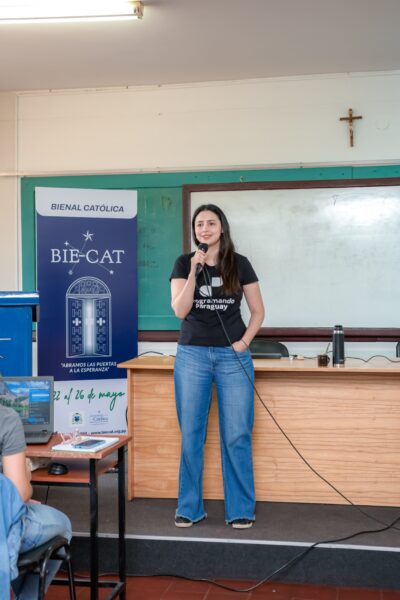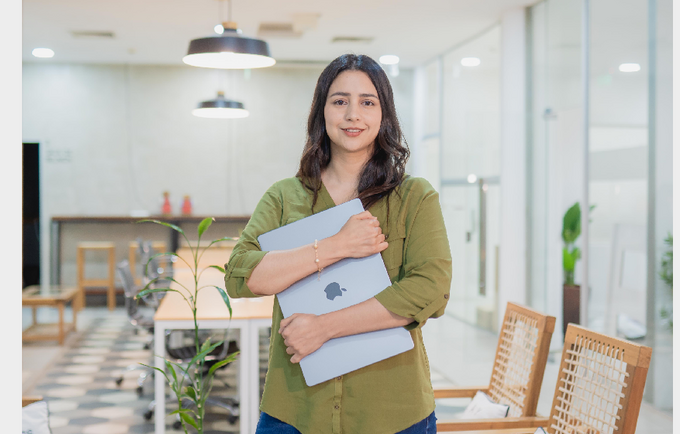Asunción, Agencia IP.- From an early age, the vocation of computer engineer Vanessa Cañete was marked by affection. Her grandfather, a visionary chemical engineer, introduced her to computing and convinced her that it would be the key to the future. Gradually, he assigned her research tasks on the computer, sparking a curiosity in her that grew over time.
In an interview with the United Nations Population Fund (UNFPA) in Paraguay, Vanessa commented that her educational path was not without obstacles. Women were a minority in her field. «There was marked discrimination. Some professors treated us as if we couldn’t do the same as men,» she recalls her beginnings. However, just as there was discrimination, she remembers that her best colleagues, who helped her start her first algorithms, were men.
After graduating as a computer engineer, Vanessa pursued a Master’s in Business Administration and General Management from Alfonso X El Sabio University and dedicated herself entirely to her profession. Today, at 34, she is the Managing Director for Willdom Paraguay, a software development company, and president of the Paraguayan Chamber of the Software Industry (CISOFT). She is also part of Programando Paraguay, an initiative that seeks to connect young talent with opportunities in the tech sector, and one of the founders of Girls Code, an organization dedicated to reducing gender gaps in technology.
In a world where the labor structure is rapidly changing, the United Nations (UN) estimates that 75% of jobs by 2050 will be in the STEM fields (Science, Technology, Engineering, and Mathematics). This represents a significant challenge for women, as they currently occupy only 22% of positions in artificial intelligence.
Nationally, among the experts categorized in the National Program for Research Incentives, women represent only 15.7% of specialists in Engineering and Technologies, Mathematics, Computer Science, and Physics, according to data from the study «The Challenges of Women Researchers for Their Entry, Permanence, and Promotion in the National System of Researchers of Conacyt» (Pintos, 2017).
Vanessa’s story shows how daring to lead in a changing world can be the starting point for generating changes in society and the future of girls and women. The mission of UNFPA is directly linked to the work of this computer engineer, as it seeks to prevent and reduce gender-based violence and other harmful practices, as well as discrimination, and to promote actions that help develop the full potential of young people.
Leading to close gender gaps
When Vanessa was a teenager, she often organized school and church activities. «I was a circumstantial leader,» she recalls, as she got involved or took the lead when asked or needed. Though she was already convinced that group work produced better results, she didn’t know much about leadership.
In 2016, an event changed her perception of leadership. She was invited to a workshop with professionals from her field, where she encountered a reality that impacted her: the low participation of Paraguayan women in this sector. That experience made her realize that «leadership is the only way to achieve dreams.»
Along with other women with similar concerns, she founded Girls Code in 2017, a non-profit association whose mission is empowering women and closing gender gaps in the tech field. To this end, the organization conducts programming and robotics workshops for girls and, in recent years, has expanded its coverage to include young women. Today, more than a thousand girls have received some form of training.
Working with little funding, Girls Code has established itself as a space where women can help improve access to the STEM world. «The most important achievement is that other women recognize the problem. Because simply identifying as someone who understands gender barriers changes our whole perspective on life,» she reflects.
The association is also working to establish itself as a platform that manages research funds for women in science. According to Vanessa, her greatest dream is to see gender gaps disappear. «Someday, an organization like ours will no longer be necessary, and instead of celebrating another year, we will celebrate that our mission was accomplished.»
First CISOFT president

Last year, Vanessa was elected president of CISOFT, a space for connection between industry, government, and academia that seeks to collaborate in generating programs and policies that promote the development of a technological ecosystem. She is the first woman elected to this position in the organization’s 22-year history. «I consider this achievement very important because it breaks gender barriers. Businessmen and businesswomen also show with their support that they want to see more women leading. This highlights the evolution towards a more inclusive industry.»
Her biggest challenge in this role is to unite the leaders of tech companies to consolidate a strong chamber that can be the space where firms develop capabilities, both national and international business, and a permanently open channel to work with the government. «We believe that the knowledge economy can change the history of this country, but mainly the history of each person,» she emphasizes.
Through the campaign «I Want to Live Like This! #WithoutViolence,» the stories of women who develop their potential in various sectors are explored. In partnership with the Ministry of Information and Communication Technologies (MITIC) and other public entities and civil organizations, the work of women like Vanessa, who are committed to their profession and the development of their peers through technology, is highlighted. She is unequivocal: «Awakening early interest in science and technology in girls is something we must do as a society. It is what will allow us to have a more inclusive future.»

